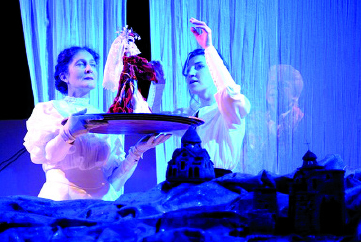
Grodno Puppet Theatre has just marked the 200th anniversary of Mikhail Lermontov’s birth by staging the great Russian writer’s Demon, directed by Oleg Zhyugzhda. The play is unusual in featuring both late-19th century aristocratic manners and the wild spirit of mountain children: the key characters.
At first sight, the plot is simple: an eastern family prepare for the arrival of a fiancé, who fails to appear, having been killed by bellicose nomads. The girl’s broken soul then finds consolation in the love of an otherworldly creature. Mr. Zhyugzhda believes the laconic and colourful tale is worthy of staging, having a deep message. He tells us, “Lermontov’s Demon is my favourite poem, having been inspired by my mother, who knew it by heart. The plot is completely fabulous, being a melodrama interlaced with atheistic and philosophical motifs: a young girl’s expectation, a failed marriage, seduction, descent, and the ruin of the protagonist’s hopes, which were founded on love.”
The scriptwriters have attempted to preserve the poem’s eastern mood, recreating Vrubel’s bright strokes and recognisable pictures: a laden table, scattered pomegranates, fanciful jugs, and the rhythmic roll of Georgian drums interchanged with church music. The experiment is a success, drawing rapt audiences. Even the aisles are full in the theatre’s small hall and the tickets are sold out well in advance.
Mr. Zhyugzhda admits that it would have been preferable to have a large auditorium, seating several hundred, but this would have changed the intimacy generated by a small space. Audiences feel at once part of the action, seeing the actors’ eyes, the sound of their breathing, the rustle of fabrics and even minor gestures.

The Demon is not the first Russian classical poem to be staged by Grodno’s Regional Puppet Theatre, which premiered Queen of Spades in 2010 — based on Alexander Pushkin’s mystical story. The performance won several Republican and international contests. A year later, Gogol’s Viy followed: a frightful fairy-tale for adults, with flying coffins and aggressive evil spirits. Mr. Zhyugzhda has also staged Dostoevsky’s Crime and Punishment, at Ryazan’s Puppet Theatre.
He tells us, “There is probably nothing more satisfying than interpreting a well known myth. I love to take works from dusty bookshelves and show that these novels and poems can be interesting and relevant to our modern times. I’m not afraid of asserting that we’ve gained a whole new adult audience to the Puppet Theatre thanks to our staging of Russian classics. We’ve shown that our theatre doesn’t just stage fairy-tales for children but magical works which inspire people to return.”
After staging classical works, it’s difficult to part ways. Interestingly, audiences especially admire performances which appear unsuitable for a puppet theatre. Mr. Zhyugzhda is now considering staging Chekhov’s Seagull or Saltykov-Shchedrin’s Golovlevs, wishing to breathe new life into the tales.
Our society admires those who read classical works (or pretend to) and there’s no doubt that watching a performance can inspire audiences to read the original, drawing comparisons between the two. Russia classical literature needs no expensive promotion since the authors and titles speak for themselves. A director simply needs to demonstrate their relevance to our modern times and present a staging that does not disappoint.
By Katerina Charovskaya











